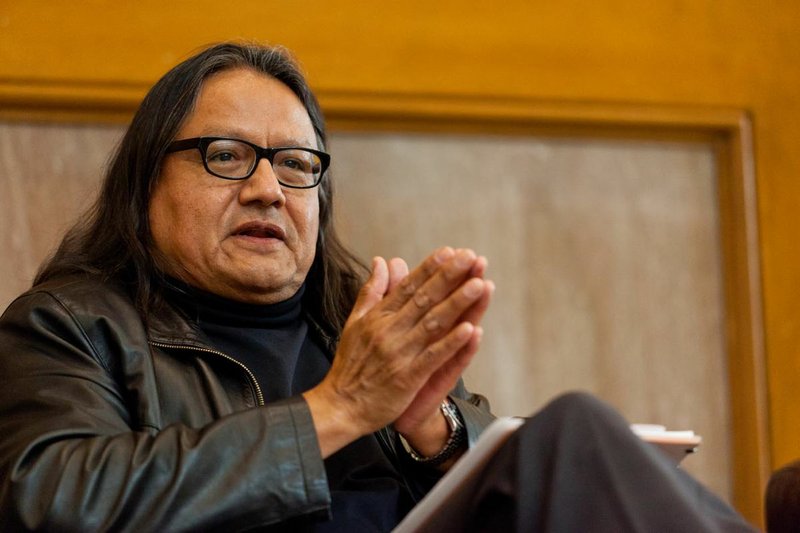He is described as "a leading figure in critical race theory, environmental law and federal Indian law," and his CV will explain that he was educated at Stanford University, Yale Law School and the University of Michigan Law School; that he was Bryant Smith Chair in Law at the University of Texas School of Law and taught at The University of Minnesota Law School, where he served as associate dean; that he is a former president of the Association of American Law Schools; and that he was deputy assistant attorney general for the Environment and Natural Resources Division of the U.S. Department of Justice in Washington, D.C., and counsel to then U.S. attorney general Janet Reno.
What his work history won't tell you is that he is a published poet who would have continued in grad school in English, but "I thought I'd better choose something that would help me pay the bills." Or that he plays blues harmonica and a year or so ago, followed and documented a group of musicians as they walked the Camino de Santiago in Spain. Neither will it convey the tenderness in his voice when he talks about his grandmother, who passed away two days before his son was born, or the joy when he marvels that naming him after her apparently worked out well.
FAQ
House of Songs Ozarks:
Gerald Torres and Ramy Essam
WHEN/WHERE — Torres: 6:30 p.m. Saturday at Museum of Native American History in Bentonville; with Essam: 7:30 p.m. Monday at the Faulkner Performing Arts Center in Fayetteville
COST — MONAH free; Faulkner $5-$15
INFO — 273-2456 or 575-5387
"You know how you meet these people who are just powerful people, not bombastic or loud, but they just have this gravity," he says of his grandmother. "She'd walk into a room, and the room organized itself around her. That kind of quiet power, I really appreciate; I think it's a kind of grace actually. Anyway, I found her wedding picture from 1917 or something, and her face is [my son's] face. It's unbelievable.
"He's a filmmaker -- which means he has to be creative and have incredible focus. I think he got some of that from her."
But the gentler side of Torres doesn't mean he takes his commitment to tribes and native identity lightly or that he's anything less than passionate about his role in Indian law. Raised in the "high desert" in southern California, he identified as native early on, thanks to his mother's side of the family, Indians from northern Mexico. He started his law career focused on social justice -- working with the Children's Defense Fund and its founder Marian Wright Edelman -- and then shifted to environmental law and Indian law. His visit to Northwest Arkansas is part of a House of Songs project to connect native people of all kinds -- from Native Americans to Egyptian rock star Ramy Essam, with whom he'll perform.
Torres will also speak at the Museum of Native American History during his visit. His topic? "Water Is Where We All Begin," and while "Indian water rights and the struggle between various claimants to water" might not sound enthralling, it's a good bet it will be.
"Water is the center of life," he says. And he's off on that topic, as eloquent as ever.
NAN What's Up on 01/19/2018
